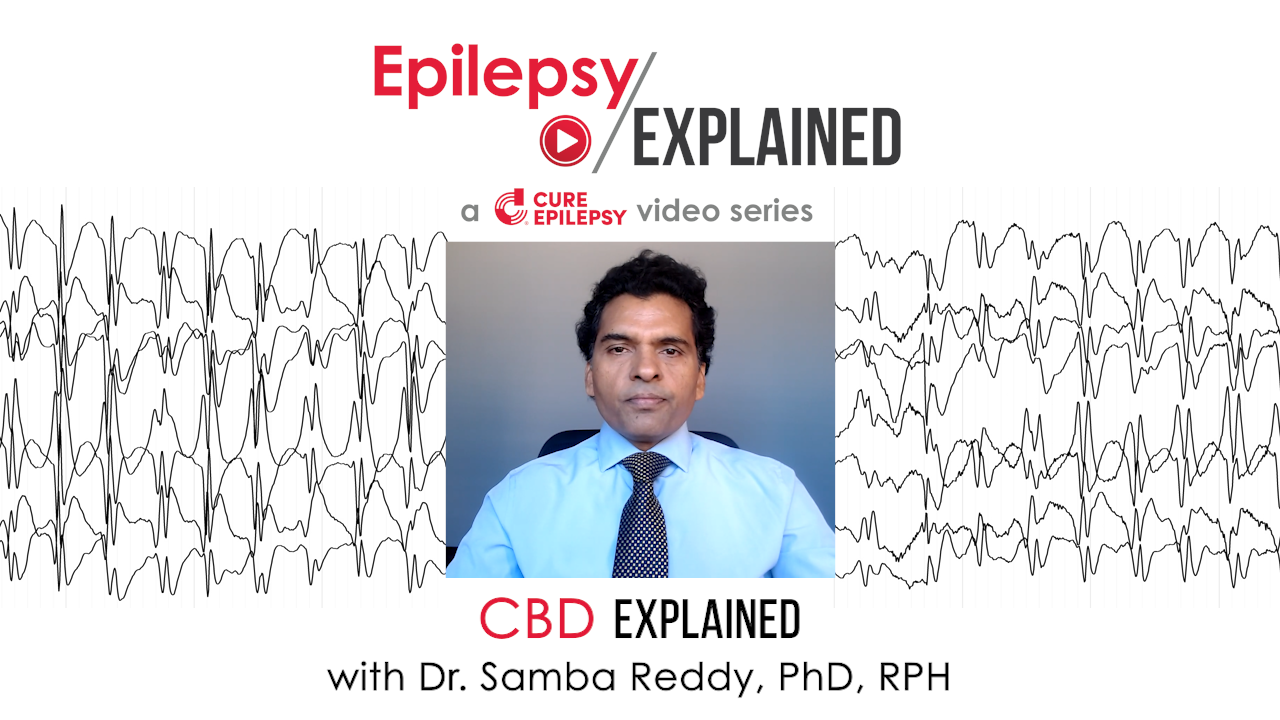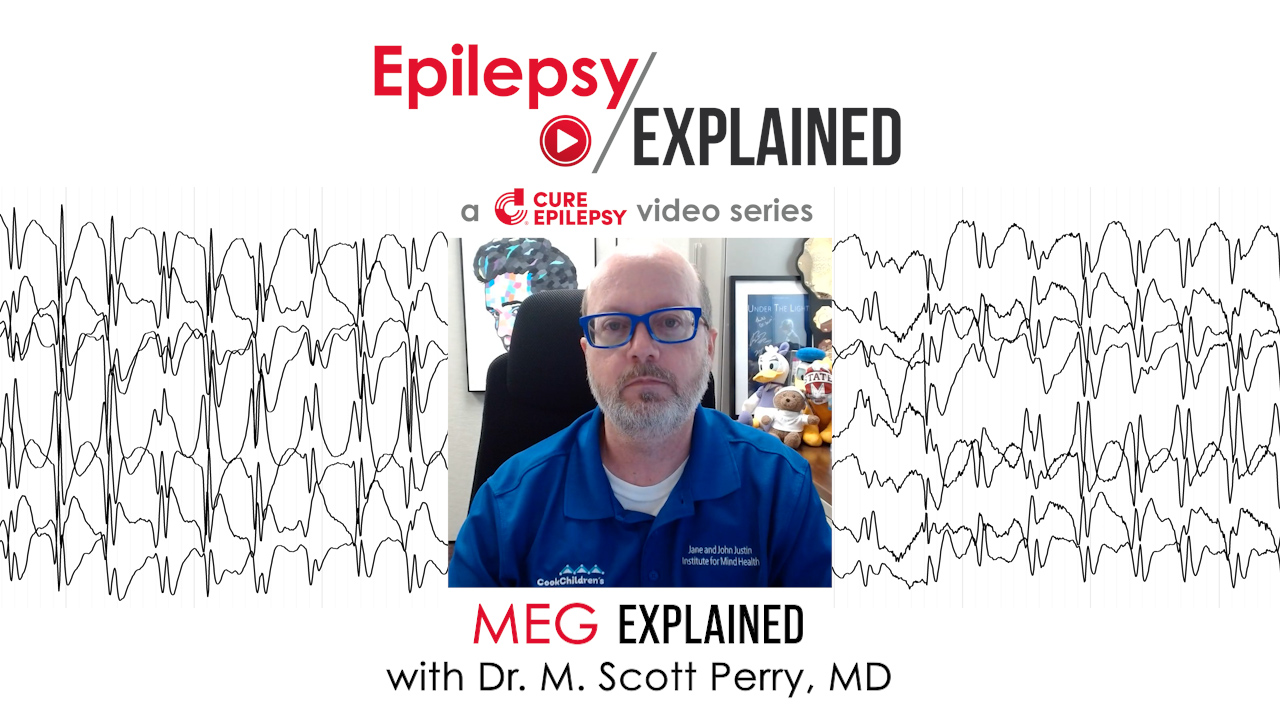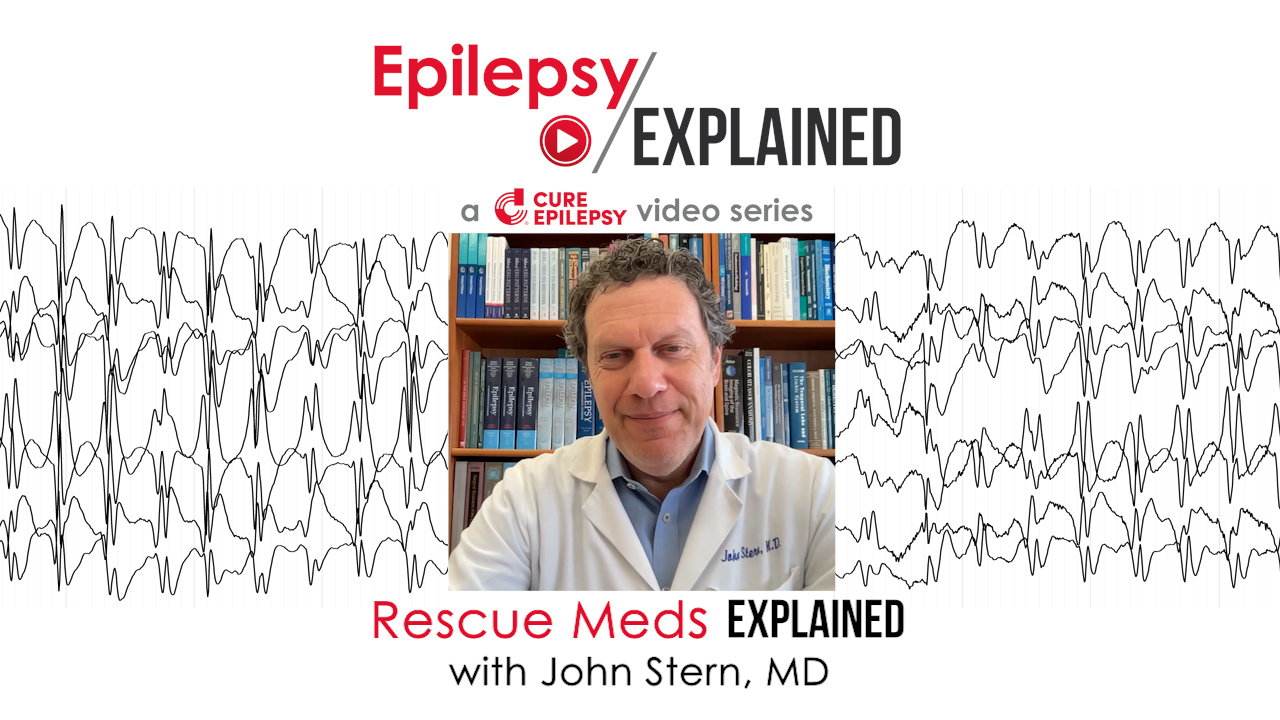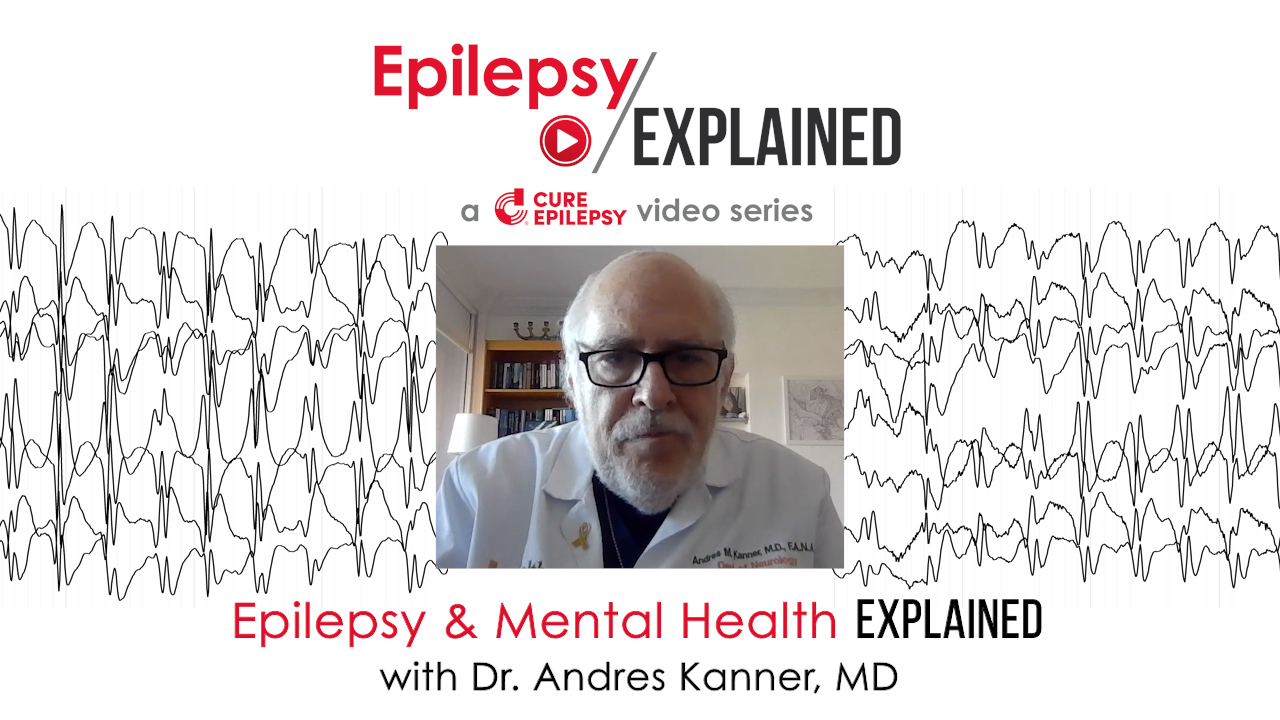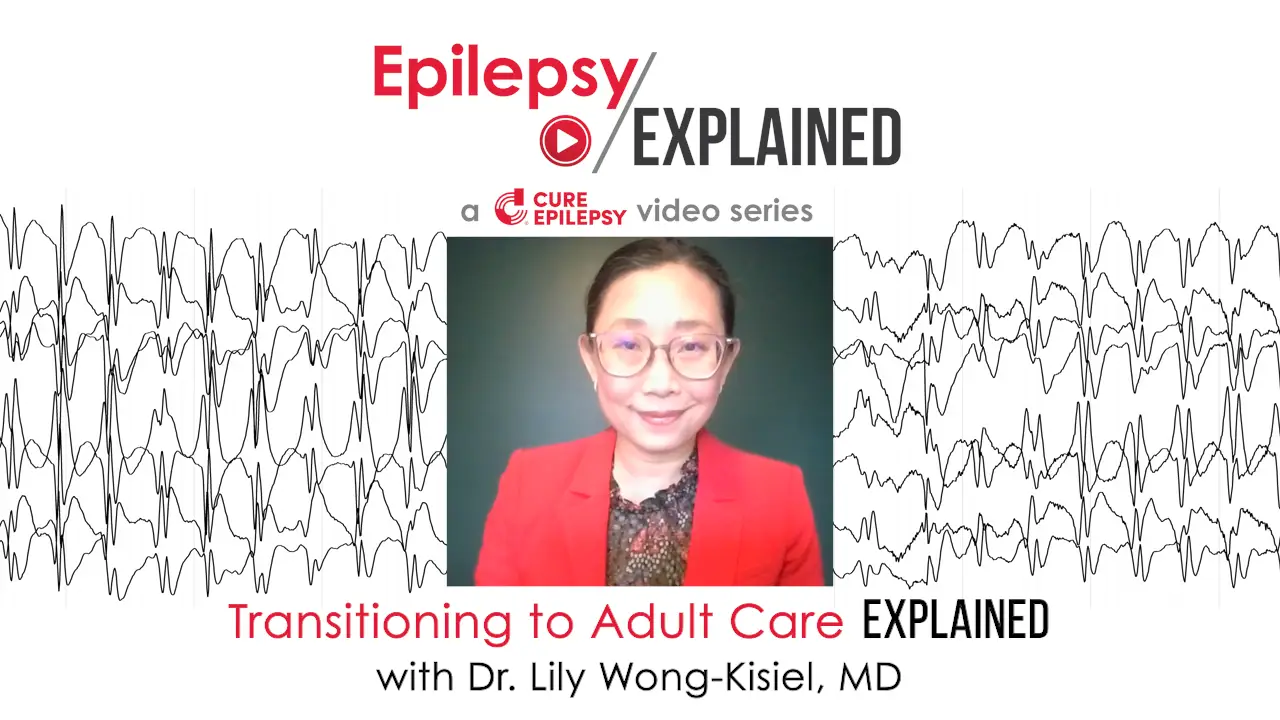How CBD is used to treat epilepsy
This month on Epilepsy Explained, we focus on CBD as a treatment for epilepsy with Dr. Samba Reddy, PhD, RPH, Director of the Institute of Pharmacology and Neurotherapeutics at the Texas A&M University College of Medicine. In “CBD Explained”, Dr. Reddy answers the following questions.
0:21 What is CBD?
1:19 Is CBD the same as medical marijuana and cannabis?
2:44 Can CBD be used to treat epilepsy?
4:02 Is CBD safe to use?
5:56 Do we know why and how CBD helps relieve some people’s seizures?
7:10 How do I get CBD?
9:04 How is CBD administered?
10:20 Will insurance cover CBD?
Look for new episodes of Epilepsy Explained on the third Wednesday of every month on CURE Epilepsy’s YouTube Channel and here on our website.
Video Transcript
What is CBD?
Dr. Samba Reddy: CBD stands for cannabidiol, which is a chemical extracted from the cannabis plant. It’s a member of the cannabinoid class, which refers to substances that act on cannabinoid receptors in our body. It is one of over hundred cannabinoids derived from the cannabis plant, which are collectively called phytocannabinoids.
CBD produces a lot of protective effects, such as reducing seizures in certain forms of epilepsy and providing relief from chronic pain. Actually, CBD is FDA approved the treatment of certain genetic forms of epilepsy. Notably, CBD does not produce psychoactive effects, and thus, it is not considered a controlled substance.
Is CBD the same as marijuana and cannabis?
Dr. Samba Reddy: CBD is not the same as marijuana or cannabis. Cannabis is a generic term used to describe products derived from the cannabis plant, which includes CBD, but also hundreds of other compounds. Marijuana typically refers to specific cannabinoid derivatives with the euphoria producing substances such as THC, tetrahydrocannabinol. THC differs from CBD in its chemical structure and effects on the brain. THC is a potent psychoactive, euphoria producing cannabinoid and is classified as a Schedule I controlled substances due to its potential for abuse.
In contrast, CBD does not have euphoria effects and is not a controlled substance. CBD, in a pharmaceutical grade product, is actually a cannabidiol oil approved by the FDA. Therefore, cannabis and marijuana contains many other compounds unlike CBD that includes greater levels of THC, and they are not FDA approved for any medical use.
Can CBD be used to treat epilepsy?
Dr. Samba Reddy: Yes. In fact, CBD is an effective anti-seizure medicine. In 2018, the FDA approved a purified CBD extract, a brand name called Epidiolex, for three severe genetic epilepsy syndromes: Lennox-Gastaut syndrome, Dravet syndrome, and tuberous sclerosis. CBD was first investigated under a compassionate use protocol in children who failed to respond to standard anti-seizure medicines.
Later, in patients with these conditions, multiple placebo-controlled clinical trials eventually showed that CBD is highly efficacious, both by itself in the form of monotherapy and also in combination as add-on therapy with another anti-seizure medicine, clobazam. These studies showed that CBD produces a significant reduction in seizure frequency and an increase in the number of positive responders. It is well-tolerated in these patients with limited side effects. Dosage and delivery methods have been tested in randomized clinical trials.
Is CBD safe to use?
Dr. Samba Reddy: Generally, CBD is very safe for use for treatment of epilepsy in children and adults if used as directed by the prescription by the physician or a clinical pharmacist. However, there are some limitations to keep in mind, especially two aspects. One is side effects. Second is interaction with other medication we call drug interactions. Some side effects have been observed, including somnolence and sedation such as sleepiness, anorexia, that is decreased appetite, fatigue, feeling very tired and weak, diarrhea, fever, insomnia, and mood changes, including thoughts of suicide, and skin rashes. Very rarely, it may cause increase in seizures.
We must note some warnings. Due to its potential for causing sedative effects, patients are advised not to drive or operate machinery until they have become acclimatized to CBD therapy. It is also important to be aware about CNS drug cocktail effects. Concomitant use of CBD with other CNS depressant substances such as alcohol may increase the risk of sedation and somnolence.
CBD is also known to affect liver enzymes involved in the metabolism of some medicines. In some cases, liver damage has occurred in people taking CBD. Because the liver metabolizes other medicines, it is important to review all of the medications the patient is taking and then adjust the dosage as necessary to avoid the drug interactions and the risk of side effects.
Do we know why and how CBD helps relieve some people’s seizures?
Dr. Samba Reddy: Although CBD is well-known anti-seizure medicine, its exact mechanism is not fully understood. However, research shows that CBD has strong anti-inflammatory properties and neuroprotective activities, which may contribute to its protective efficacy in some people with epilepsy. There are acute immediate effects and chronic long-term protective effects observed days and weeks after taking CBD.
CBD may work through multiple mechanisms like binding to cannabinoid receptor proteins, which are present in the brain and also peripheral immune cells. The other target of cannabinoids is the endogenous cannabinoid system, which regulates neuronal excitability, a key feature in seizures and pain and inflammation and immunity, both in peripheral and the central nervous system. Cannabinoids are thus an area of research interest to test the potential disease-modifying therapy for epilepsy.
How do I get CBD?
Dr. Samba Reddy: By prescription only. CBD products are valuable by prescription for the treatment of specific seizure disorders that is Lennox-Gastaut syndrome, Dravet syndrome, and tuberous sclerosis complex. Consult your medical provider to learn more about CBD for epilepsy. CBD can also be obtained through licensed medical dispensaries for some patients. Here, there are two crucial factors for CBD therapy. One is dosage. Second is clobazam co-therapy, which plays significant role in affecting the overall efficacy of CBD and its side effects.
In terms of the dosage, greater potential for side effects is an issue with higher doses of CBD. Prescription doses are selected to maximize the clinical benefits with minimal side effects. Adverse effects should be assessed before CBD prescription. Because of the risk of liver injury, it is advised to get a liver function test prior to starting CBD therapy.
Drug interactions are a crucial factor. CBD is metabolized in the liver by CYP enzymes. The dose of CBD may need to be adjusted if there are other medications that affect the CYP enzymes in the liver. Clobazam interaction is a well-known factor. Co-administration of CBD with clobazam produces a threefold increase in the plasma levels of N-desmethylclobazam, the active metabolite of clobazam, which is a benzodiazepine anti-seizure medicine. This may cause an increase in the risk of side effects.
How is CBD administered?
Dr. Samba Reddy: CBD is available as oral oil-like solution, 100 mg/ml. In pharmacies, it is dispensed in 100 ml bottles. Since it’s an oily solution, it should be stored at room temperature, not in the refrigerator or freezer. Typically, the doses are 2.5 or 10 mg/kg to be taken by mouth twice daily preferably with food, because food enhances the absorption of the CBD. Because it’s a short-acting medicine, it should be taken twice daily because it stays in the body for three to five hours.
It’s important for patients with liver impairment, dosage adjustment. Typically, reduction of the dose is recommended. In case of discontinuation, when CBD is being discontinued, the dose should be gradually decreased. This will avoid the recurrence of seizures that may happen in case of abrupt discontinuation of CBD therapy.
Will insurance cover CBD?
Dr. Samba Reddy: Most insurances cover this medicine by prescription for purified CBD products and FDA approved formulation of CBD called Epidiolex. Co-pay cost may depend on insurance coverage. CBD products can also be obtained from state licensed medical dispensaries. Please check with your insurance provider if they cover these products.





